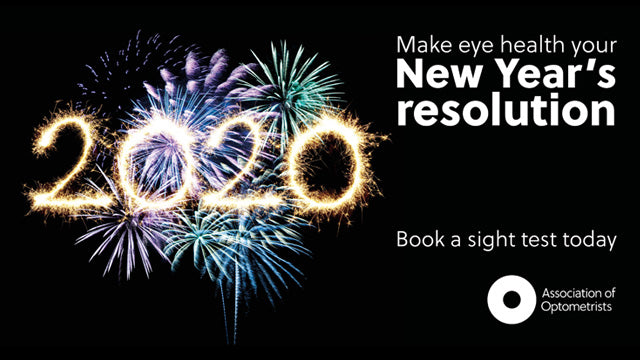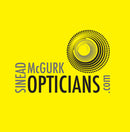
BE KIND TO YOUR EYES - 20/20 IS THE YEAR TO START
Posted on
Choose eye health for your New Year's resolution and make it the one you won't break
- A fifth (21%) have not had a sight test within the last two years1 but regular checks protect sight by making sure eye conditions are picked up and treated early
- Over one million people in the UK are living with avoidable sight loss2
- As well as an eye health check, a sight test can detect signs of general health conditions, such as diabetes, high cholesterol and high blood pressure
Losing weight, more exercise, saving money and learning a new skill all make the top 10, but keeping to your New Year’s resolutions is conspicuously more difficult than it seems.
Around 30% of us will make a New Year’s resolution3 but according to research, over half of the UK (66%) will last a month or less, while 80% of people give up on their resolve by the end of March4.
This is why the Association of Optometrists (AOP) is challenging the public to keep just one resolution in 2020 – to have regular sight tests.
Speaking about the value of sight tests, optometrist Roshni Kanabar, Clinical and Regulatory Adviser at the AOP said: “Eye health is one of the easiest resolutions you can make and keep –and the benefits are huge. Regular sight tests can’t promise 20/20 vision, but they will make sure that any problems or symptoms of eye disease are picked up early and it could end up saving your sight. At least 50% of all sight loss is avoidable so having checks, regularly, is the most important thing you can do to protect it.”
Other New Year’s resolutions that are kind on your eyes
1. Stop smoking
Many people are unaware of the link between smoking and eye disease. Smoking significantly increases the risk of developing eye diseases, such as cataracts and age-related macular degeneration.
2. Eat healthily
Eating a healthy, balanced diet reduces your risk of eye disease. Include lots of omega-3 fats, found in oily fish, and lutein, found in dark-green, leafy vegetables such as spinach and kale. Vitamins A, C and E are also helpful, so eat at least five portions of fruit and vegetables a day.
3. Wear prescribed glasses
Many eye and vision problems develop or increase as we get older. Contrary to the myth, wearing glasses and contact lenses doesn’t make your eyesight worse – they help your eyes work more efficiently.
4. Wear sunglasses
Sunshine may seem a distant memory at this time of year but as well as making your vision more comfortable, sunglasses protect your eyes from UV light. When choosing sunglasses, you should always make sure that they carry the CE or British Standard marks.
Launching on 27 December, the AOP’s 20/20 eye health campaign, which includes posters displayed in opticians, GP and dental surgeries nationwide, reminds people to have a sight test every two years, or more often if their optometrist recommends it.
NHS sight tests are available for children under 16, those aged 60 or over, and other key groups. As part of the campaign, the AOP has produced patient leaflets explaining who is eligible for NHS-funded sight tests in England, Northern Ireland, Scotland and Wales. For more information, visit www.aop.org.uk/patients
Association of Optometrists
The Association of Optometrists (AOP) is the leading representative membership organisation for optometrists in the UK. We support over 82% of practising optometrists, to fulfil their professional roles to protect the nation’s eye health. For more information, visit www.aop.org.uk
More information on eye health can be found on the AOP’s For patients section.
What is 20/20 vision
The term 20/20 vision is used by optical professionals in America to describe an individual’s visual acuity. In Europe, 6/6 notation is used. These figures are based on letter charts used in a sight test, such as the Snellen chart.
The top number refers to the distance at which the chart is viewed (20 feet or 6 metres) and the bottom number refers to the distance at which a person with ideal vision can see a letter clearly.
Notes
- Opinium Research for AOP of 2006 UK adults, 14 - 17 June 2019
- Based on calculations from Fight for Sight using the IAPB Vision Atlas (“Vision Atlas”) gives the following in the UK in 2015
- Based on the outcomes of previous surveys: ComRes poll for Bupa of 2014 UK adults, November 2015 and YouGov survey for The Times, December 2014
- ComRes poll for Bupa of 2014 UK adults, 20 - 22 November 2015
Quick links
Contact info
4-6 Queen St, Magherafelt, BT45 6AB.
Mon - Fri, 9am - 5pm
Tues to 7pm by appointment only.

